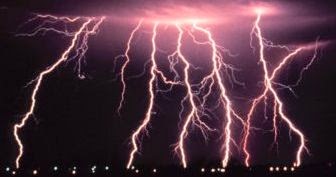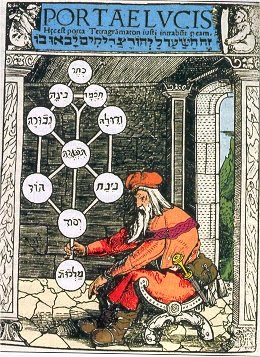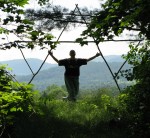I’ve become quite lax in the last few weeks about throwing around the word “God.” I talk about “the light of God” and I don’t really stop to ask which God. Quaker worship and Quaker conversations tend to encourage that. The Light that we experience in meeting really doesn’t announce itself by name, and the Biblical names for G*d that Christ-centered Quakers like to use simply do not map onto Quaker experience (at least not onto my experience) or onto the Biblical narrative with anything like one-to-one correlation.
When I first became Pagan, when I tried for the first time using a polytheist perspective in thinking about the divine, I asked myself What are the Gods? And what do they want of us? I don’t claim any Revealed Truth on this question, but the tentative answers that I came up with twenty years ago still work for me.
I imagine a thundercloud, and lightning striking the ground. The clouds are undifferentiated and cover the entire sky (God is one, infinite and unknowable) but lightning bolts touch the Earth in
 |
| Image from NOAA |
specific places (The Gods are individual; they are drawn to us and touch our lives).
I also find the Kabalistic image of the Tree of Life to be helpful. The Tree (at least in the post-Elizabethan High Magic traditions that have made use of Kabalistic imagery) can be described as a map of creation. Ten Sephiroth, or spheres, describe ten stages of manifestation beginning with pure undifferentiated spirit at
 |
| Tree of Life |
the level of the divine and ending with concrete manifestation here in the material world. Along the way, creation passes through stages of increasing particularity. You don’t need to know all the details to get the idea of more individual at the bottom and more archetypal at the top. The traffic ticket on your windshield might be a far cry from the Platonic ideal of justice, but the one is ultimately grounded in the other, and along the path between them you find governmental systems and own constitution, and then laws and executive structures established to carry out those laws, reaching on down to the police force in your own town. You can deal with the ticket at the level of manifestation and just pay the fine, or you can fight it all the way to the Supreme Court where you call upon the highest principles of justice that have shaped human laws all through history, or you can stop at any of the intervening levels.
The individual Gods and the one unknowable G*d are like that, I think. An unusual rock or a pool of water may call to mind the awesome powers of creation, and a worshiper may fall to his knees and pray to it. A philosopher of religion may write a treatise on That Being Greater Than Which Cannot Be Conceived, but never feel the stirrings of awe in his heart or in his belly. Yet both are engaging with the same divine reality, just at opposite ends of the Tree.
So, during and after a week-long gathering of hundreds of Quakers, I find myself tossing around the word “God” as if I were a monotheist, and not worrying about it too much.















